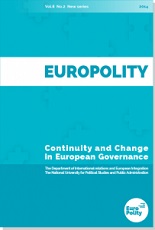A THEORETICAL APPROACH TO THE EFFECTS OF EXTERNAL FUNDING ON WOMEN AND GENDER BASED NGOS IN ROMANIA AND POLAND
A THEORETICAL APPROACH TO THE EFFECTS OF EXTERNAL FUNDING ON WOMEN AND GENDER BASED NGOS IN ROMANIA AND POLAND
Author(s): Andrada NimuSubject(s): Politics / Political Sciences
Published by: Scoala Nationala de Studii Politice si Administrative (SNSPA)
Keywords: Civil society; External funds; Isomorphism; Poland; Romania; Women and gender based NGOs
Summary/Abstract: After the collapse of Communism in Central and Easter-European countries, women, with less political and symbolic resources, organized themselves outside the political parties in various NGOs, so to persuade politicians to vote for laws against discrimination, domestic violence and for gender equality, and to influence equal opportunity policies and the democratization process. After more than two decades of economic, social and cultural transition, I analyse how women and gender based NGOs have been affected by external financial aid (European, Swiss and Norwegian) that generally supported their actions. The aim of this research is to understand to what extent and with what effects were these social funds implemented in Romania and Poland. In this regard, this article deals with the theoretical assumptions of sociological institutionalism, which suggest that the more NGOs are dependent on financial resources provided through targeted programs, the more they become isomorphic in their organizational structure. Distinctions are made in relation to NGOs and the civil society sector, so to provide an operational definition of non-governmental organizations and why these organizations are susceptible to change. The pressures that this sector encounters are further presented, in relation to the two countries under analysis so as to highlight both the similarities and the differences between these organizations and identify further directions of analysis.
Journal: Europolity - Continuity and Change in European Governance
- Issue Year: 9/2015
- Issue No: 1
- Page Range: 161-188
- Page Count: 28

